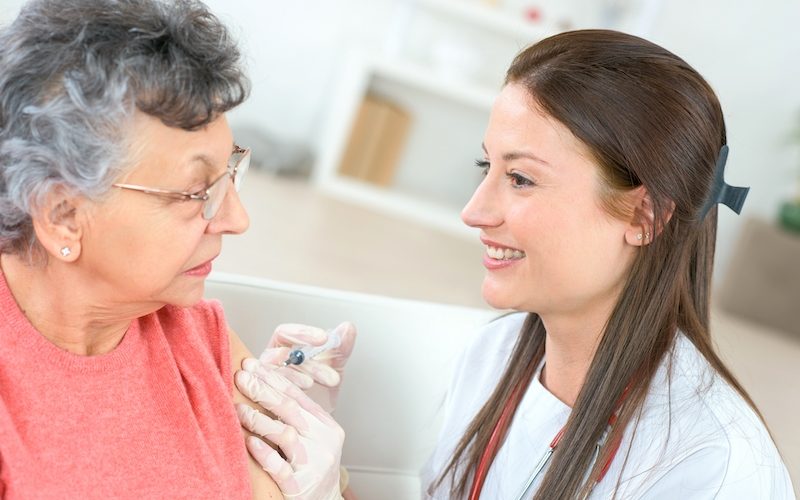
A Primer On Vaccines
Posted on 05/17/2021
Shipments of the COVID-19 vaccine are being distributed throughout the country, and they are being specifically allocated to the highest priority groups. The first doses were recently administered to frontline healthcare workers, and now the vaccine is being made available to residents of senior living communities. The health and safety of our nation is heavily dependent on combating the COVID-19 virus. Here is some information about vaccines, including clarifications to some common misconceptions concerning the COVID-19 vaccine.
A History of Vaccines
A vaccine is a biological agent that provides people with active immunity to a particular infectious disease. Vaccines are given in the form of shots, generally in a person’s arm, and are usually comprised of either a small amount of the live disease or of a synthetic agent that mimics the behavior of the real infectious disease. According to the CDC, when someone is given a vaccine, their body’s immune system generates more red and white blood cells to fight against the vaccine (which is perceives as an infection). In this way, the body “learns” how to fight against the virus and will “remember” how to fight against it if the person later becomes exposed to the actual virus. This is referred to as building up an immunity.
Vaccines originated as a means to prevent the deadly smallpox disease. In the 1700s, Edward Jenner came up with the idea of inoculating people with the material from the smallpox blisters of an infected patient. This skin-to-skin inoculation was successful in helping people build up an immunity to the smallpox. From the early 1900s through the 1950s, medical advances enabled researchers to develop large-scale production of vaccine shots for diphtheria, pertussis and tetanus (now given as one vaccine, called DPT) and polio.
The COVID-19 Vaccines
Two COVID-19 vaccines are currently being distributed in the United States, and others are in different phases of testing. Both vaccines currently being distributed throughout the U.S. use something called messenger RNA (mRNA) which mimics the spikey structure of the protein that coats the Coronavirus. When a patient’s immune system recognizes that the mRNA should not be in the body, it starts making antibodies. Here is some additional information about two COVID-19 vaccines:
- Pfizer/BioNTech vaccine: This vaccine is administered in two doses, 21 days apart. Initial studies show that about a week after the final vaccination, people are roughly 95% immune from becoming seriously ill from COVID-19.
- Moderna vaccine: This vaccine is administered in two doses, 28 days apart. Initial studies show that about a week after the final vaccination, people are roughly 94% immune to becoming seriously ill from COVID-19.
The Benefits of COVID-19 Vaccination
COVID-19 is a very dangerous disease. Not only is it responsible for a significant number of fatalities throughout the world, but there is also evidence of debilitating lingering effects following recovery from COVID-19. The current vaccines have been shown to be very successful in preventing people from contracting the disease, and also in reducing the severity of illness and side effects among those who do contract COVID-19. In addition, those who are vaccinated are thought to be less likely to be able to transmit the disease to others, although Pfizer and Moderna are still running tests to confirm this hypothesis.
Vaccine Myths Debunked
Unfortunately, there is a lot of misinformation circulating about the COVID-19 vaccine. Below we separate fact from fiction on this important topic:
- Fact: The COVID-19 vaccine is not a live vaccine, and therefore it is impossible to contract COVID-19 by getting vaccinated.
- Fact: Side effects from the vaccine are rare, and are generally limited to aches or pain at the injection site and occur within 3 days of receiving the vaccine. Most of the allergic reactions people have experienced have been related to the ingredients in the vaccine – not the injected biologic itself.
- Fact: There is no tracking device or microchip inserted when the vaccine is given (the Facebook video is not real).
- Fact: The vaccine will not change your DNA (the online post that has been circulating is not real).
- Fact: The Pfizer and Moderna vaccines went through rigorous, although expedited, testing before being given Emergency Use Authorization by the FDA.
Other important items to note:
- People who have a history of allergic reactions to other vaccines are urged to speak with their doctor before getting vaccinated.
- While building up immunity after a vaccine, and also until further research is conducted, continue to follow protocols for social distancing and masking in order to continue to protect others.
At Plush Mills, the health and safety of our residents is our highest priority and that includes new residents. Anyone who moves in after our first dose vaccination clinic will be able to get their first dose of the vaccine at the second clinic. A third clinic will be available for their second dose. The Plush Mills team supports residents and their families in making a hassle-free move. Contact us today to learn about our special rate incentives and to schedule an in-person or virtual tour of available apartments.